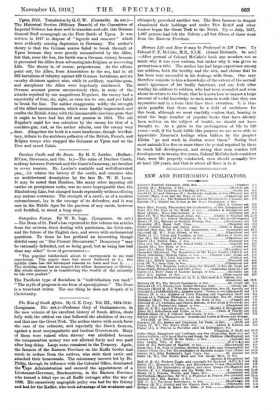Ypres, 1914. Translation by G. C. W. (Constable. 58. net.)—
The Historical Section (Military Branch) of the Committee of Imperial Defence has done well to translate and edit this German General Staff monograph on the First Battle of Ypres. It was written in 1917 to dispose of "legends and rumours" which were evidently causing depression in Germany. The author's theory is that the German armies failed to break through at Ypres because they were greatly outnumbered by the Allies, but that, none the less, the battle was a German victory because it prevented the Allies from advancing into Belgium or recovering Lille. The theory is, of course, preposterous. As the editors point out, the Allies, from Armentieres to the sea, had in all 263 battalions of infantry against 426 German battalions, and six cavalry divisions against nine, while in artillery, machine-guns, and aeroplanes the Allies were hopelessly outclassed. The German account proves unconsciously that, in some of the attacks repulsed by our magnificent Regulars, the enemy had a superiority of four, six, eight, or even ten to one, and yet failed to break the line. The author exaggerates wildly the strength of the Allied entrenchments, which were hastily improvised, and credits the British Army with the innumerable machine-guns that it ought to have had but did not possess in 1914. The old Regular's rapid fire was mistaken by the enemy for that of a machine-gun, and, as the author admits, cost the enemy very dear. Altogether the book is a most handsome, though involun- tary, tribute to the stubborn gallantry of the British, French, and Belgian troops who stopped the Germans at Ypres and on the Yser and saved Calais.






































 Previous page
Previous page